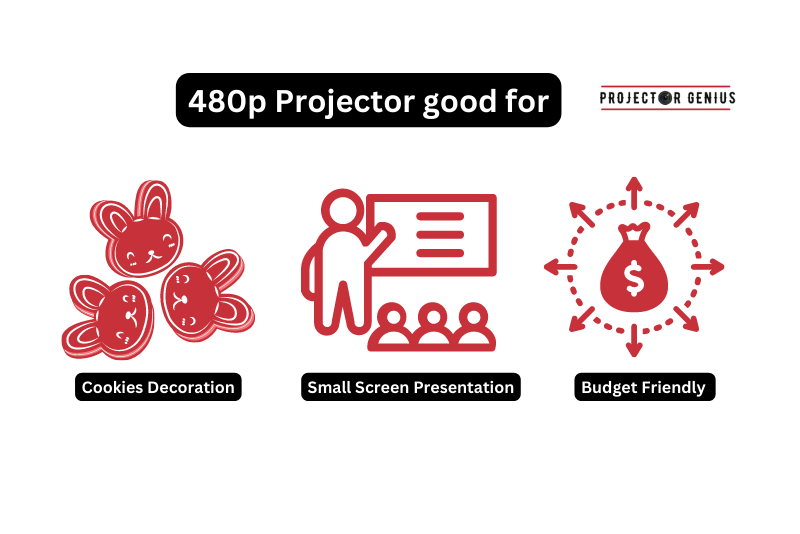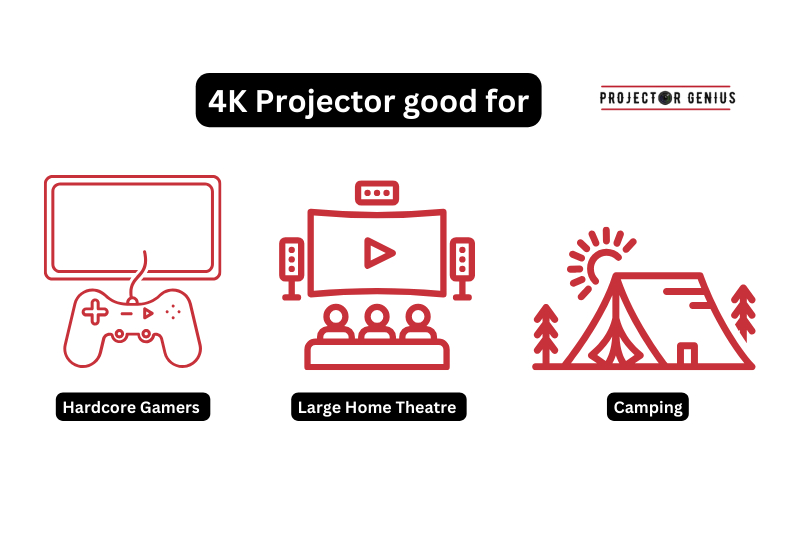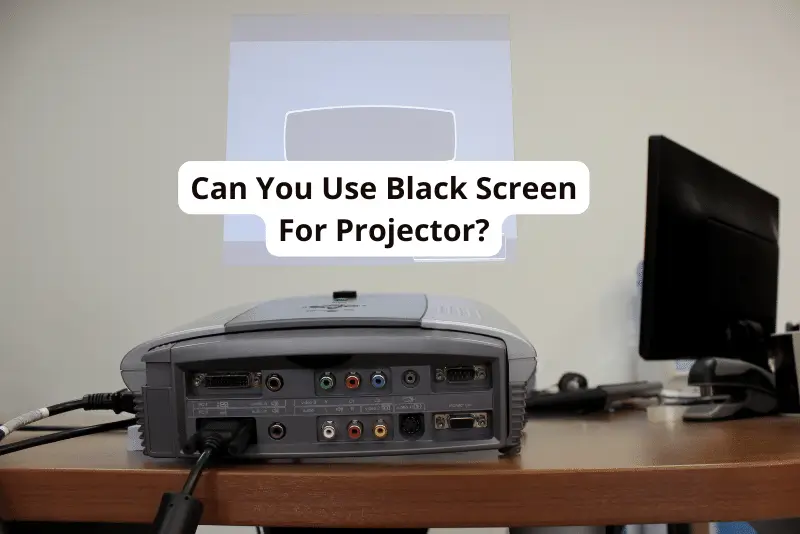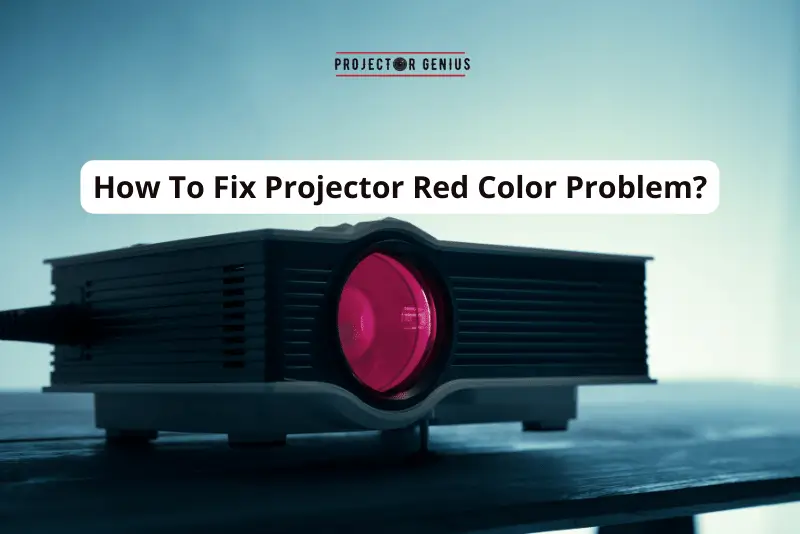480p vs 4K: Which Is Right For You In 2023?
-
 Written by:
Kristy Roger
Written by:
Kristy Roger
- Last Updated:
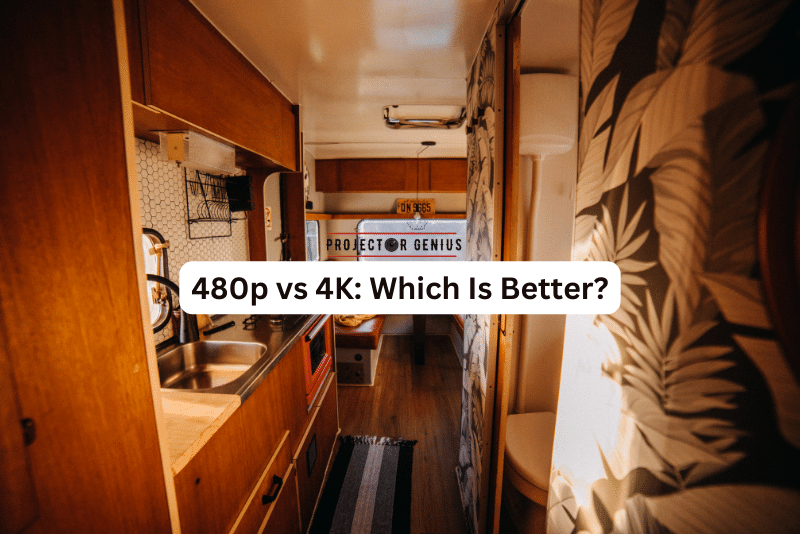
Are you wondering which is better: 480p vs 4K? There are many different types of resolutions to choose from depending on your budget and needs. In this article, projector expert Kristy Roger shares her knowledge on 480p vs. 4K comparison, with pictures of each and easy day-to-day life examples!
480p vs 4K Resolution?480p is a standard definition video resolution with a resolution of 720×480 pixels, offering lower image quality compared to 4K. 4K, on the other hand, provides a much higher resolution at 3840×2160 pixels, delivering significantly sharper and more detailed visuals, making it the preferred choice for modern high-definition content and larger screens.
I recommend using the Table of Contents to quickly access the information you need.
My article is designed to cater to home cinema users of all levels, from Beginners to Advanced enthusiasts.
Table of Contents
480p vs. 4K: What’s the Difference?
First up, let’s talk about what 480p and 4K resolution is and how they differ from one another.
What is 480p?
When a video is in 480p, it means the image is made up of 480 horizontal lines that show all the action and details. The “p” stands for “progressive scan,” which is a way the video is displayed on your screen. It’s not the highest quality out there, but it’s still pretty good, especially if you’re watching on smaller screens like phones or older TVs.
In simple words, 480p is like the basic level of video quality, not as super clear as high-definition stuff, but it gets the job done and lets you watch videos without them looking all blurry or pixelated.
What is 4K?
4K is a term used to describe a super high-resolution display format used in TVs, monitors, and screens. It refers to the number of pixels that make up the picture on the screen.
Specifically, 4K means there are around 4,000 pixels lined up horizontally, giving you a lot more detail and clarity compared to lower-resolution formats like HD (High Definition) or SD (Standard Definition).
It’s like having a sharper, more vibrant image with finer details, making everything on the screen look incredibly lifelike and crisp.
If you want to learn more, read my comprehensive comparison of 480p vs 720p and 480p vs 1080p.
480p vs 4K: The Key Difference Between 480p and 4K
Let’s break down the main differences between 480p and 4K:
480p: Think of this as the basic level of video quality. It’s like looking at a picture that’s clear enough to understand but not super sharp. With 480 horizontal lines making up the image, it’s like a simple sketch that gives you the general idea, but you might miss out on finer details.
4K: Now, imagine upgrading that sketch to a full-blown masterpiece. 4K is like that masterpiece – it’s incredibly detailed and clear. With around four thousand horizontal lines, the image is super sharp, and you can see every tiny detail. It’s like looking at a photograph taken with the highest quality camera – you can notice everything, from the smallest pores on someone’s face to the texture of a leaf.
So, the main difference is the level of detail. 4K takes you from “good enough” to “unbelievably clear and detailed.” It’s like going from watching a movie on an older TV to stepping into a high-end theater.
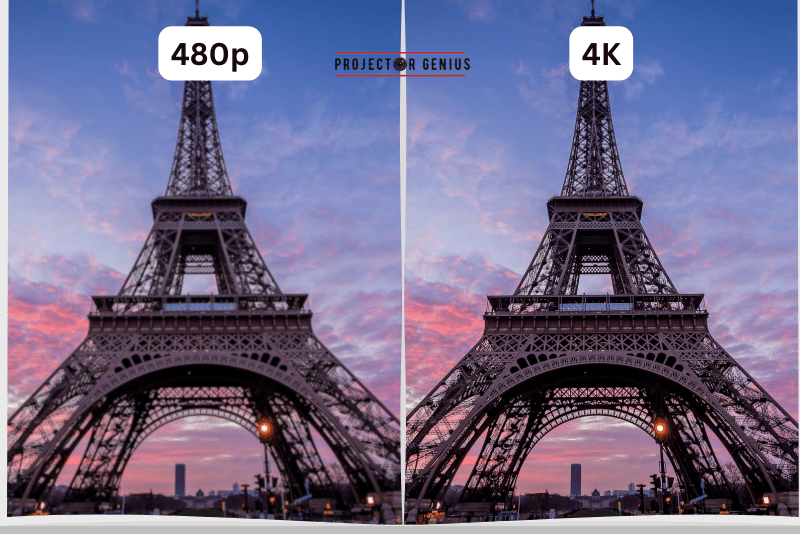
What Factors to Consider When Choosing Between 480p and 4K?
Let’s talk about what to keep in mind when you’re trying to decide between 480p and 4K. It’s like picking the right tool for the job – you want to make sure it fits your needs perfectly.
Content-Type
Think about what you’ll be watching. If it’s just casual videos or everyday stuff, 480p might work fine. But if you’re into movies, gaming, or you want that “wow” factor, 4K can bring out all the details like never before.
Screen Size
Consider the size of the screen you’re using. On smaller screens, the difference between 480p and 4K might not be super noticeable. But on a big TV, 4K can make a world of difference – it’s like having a larger canvas for all those sharp details.
Device Compatibility
Check if your device can handle 4K. Not all devices support it, and if your device can’t keep up, you won’t get the full benefit. It’s like trying to play a new video game on an old computer – it might not run smoothly.
Internet Speed
If you’re streaming, 4K requires more internet speed. So, if your connection is a bit slow, you might end up with buffering instead of smooth watching. 480p is gentler on your internet, like taking a leisurely stroll instead of a sprint.
Personal Preference
Consider what makes you happy. Some people really appreciate the super clear images of 4K, while others are okay with good ol’ 480p. It’s like choosing between a gourmet meal and your favourite comfort food – both have their appeal.
Budget
4K can come with a higher price tag, not just for the device but also for content like movies. If you’re on a tight budget, 480p might be more wallet-friendly.
In the end, it’s like shopping for shoes – you need to find the pair that fits your style, size, and where you’re walking. So, consider these factors and pick the resolution that brings your content to life in the way that suits you best!
Feel free to read my comprehensive comparison of 4K vs. 1080p
Do I Need a Special Device to Watch 4K Content?
you’re intrigued by the idea of watching content in glorious 4K, huh? Well, you’re in for a treat, but there’s a little more to it than just pressing play. Here’s the scoop:
Device Compatibility
Yes, you do need a special device to fully enjoy 4K content. Not all devices are equipped to handle those super high-resolution visuals. So, before you start dreaming about crystal-clear landscapes and lifelike close-ups, make sure your device is up for the task.
The 4K Trio
You’ll need a 4K-capable screen (like a 4K TV or monitor), a 4K source (like a 4K Blu-ray player or a streaming device that supports 4K), and 4K content (movies, shows, or videos that are shot or rendered in 4K resolution). It’s like a trio that needs to come together for the magic to happen.
Internet Speed
If you’re streaming 4K content, a speedy internet connection is your trusty sidekick. 4K videos demand more data, so a slower connection might result in buffering frustration. It’s like trying to drink from a narrow straw – you’ll get less fluid, and you might have to pause while it refills.
Processing Power
Remember, 4K content can be quite demanding on the device’s processing power. It’s like asking your computer to juggle multiple tasks at once – it needs to be up to the challenge. So, make sure your device has the processing power to handle the heavy lifting.
Budget Check
Last but not least, be prepared for a potential budget adjustment. Special 4K devices can be a bit pricier than their regular HD counterparts. It’s like upgrading from the basic model of a car to the deluxe version – more features, but a bit more investment.
In a nutshell, while you don’t need a full-on magic wand to watch 4K content, you do need a device that’s ready to embrace the wonders of high-resolution visuals. So, make sure your device checks all the boxes and dive into the world of 4K entertainment with all the right gear!
Do All Devices Support Both 480p and 4K?
Ah, the tale of device compatibility! Just like not all shoes fit every foot, not all devices can handle both 480p and 4K. Let’s unravel this tech mystery:
480p: This resolution is like the universal language of video. It’s supported by a vast majority of devices, from your trusty old TV to modern smartphones. It’s like a classic t-shirt that everyone can wear – simple and widely accepted.
4K: Now, this resolution is like a fancy party where not everyone gets an invite. While more and more devices are becoming 4K-friendly, not all of them have scored an entrance ticket. It’s like being on the VIP list – only those with the right gear can enter.
Here’s the deal: newer devices, especially smart TVs, gaming consoles, and high-end computers, are more likely to support 4K. But some older devices might not have the hardware horsepower to handle those ultra-high-definition visuals.
So, before you send out the invites for your 4K movie night, double-check if your devices can handle it. Just like wearing the right attire to match the event’s dress code, using the right device ensures you’re getting the best possible viewing experience – whether it’s a casual hangout in 480p or a high-end soirée in 4K!
Can I Convert 480p Content to 4K?
Converting 480p content to 4K is a bit like turning a regular photo into a grand masterpiece. Let’s talk about it:
The Dream vs. Reality
While it sounds like a wizardry trick, the truth is a bit more down-to-earth. Converting 480p content to 4K involves some complex processes. It’s like trying to add extra details to a painting that were never there in the first place. The result might look better than the original 480p, but it won’t suddenly become a true 4K masterpiece.
Upscaling Tools
There are tools and software out there that claim to upscale content, but remember, they can’t conjure up information that wasn’t captured in the original video. It’s like trying to make a blurry photo clearer – you might get some improvement, but it won’t be a miraculous transformation.
Quality Considerations
The thing is, when you upscale, you’re stretching those existing pixels to fit a larger canvas. This can lead to certain parts looking unnatural or overly smoothed out, like an over-enthusiastic filter on a photo.
Genuine 4K Content
The real magic of 4K comes from content that was actually shot or rendered in 4K resolution. It’s like having a high-quality camera from the start, capturing all those tiny details. So, if you’re after the true 4K experience, starting with genuine 4K content is the way to go.
In a nutshell, while there are ways to boost the appearance of 480p content, the transformation won’t be mind-blowing. It’s like trying to turn a cozy cottage into a grand palace – you can add some fancy touches, but it won’t be the same as the real thing. So, if you’re aiming for that true 4K glory, beginning with native 4K content is your best bet!
Does Streaming at 4K Require Faster Internet Speed Compared to 480p?
Streaming at different resolutions is like serving different dishes at a dinner party – the fancier the dish, the more ingredients you need. Let’s talk about streaming speed:
4K Streaming: Think of 4K streaming as the gourmet feast. It’s like serving up a multi-course meal with all the bells and whistles. To enjoy 4K content without those annoying buffering pauses, you’ll need a solid internet connection with higher speed. It’s like having a wide, high-capacity highway for data to zoom through smoothly.
480p Streaming: Now, this is more like a casual picnic. 480p streaming requires less bandwidth, so it’s like a smaller pathway for data traffic. You can get away with a slower internet connection, and your videos will still play relatively smoothly without those pesky pauses.
Think of it this way: if your internet is like a water pipe, 4K streaming needs a bigger pipe to flow smoothly, while 480p can get by with a smaller one.
So, if you’re planning a 4K movie night, make sure your internet connection is up to the task – it’s like prepping your kitchen with all the right ingredients for a gourmet meal. But for a chill, casual viewing in 480p, your internet doesn’t need to put on a full chef’s hat.
Is 4K Resolution Essential for Gaming, or is 480p Still Viable?
Gaming dilemma – it’s like choosing between wearing running shoes or hiking boots on different terrain. Let’s break it down:
4K Gaming: Playing games in 4K is like exploring a virtual world with incredible detail. You’ll see every nook and cranny, every intricate texture. It’s like having a front-row seat to a stunning visual spectacle. But, and here’s the thing, 4K gaming demands a lot from your gaming setup. You’ll need a powerful gaming rig and a beefy graphics card to handle all that eye candy. It’s like taking a sports car on a race track – exhilarating, but you need the right equipment.
480p Gaming: Now, 480p gaming is like revisiting an old favourite game. Sure, it might not be as visually dazzling as 4K, but it’s still totally viable. It’s like playing a classic board game – you’re more focused on the experience and gameplay rather than the shiny graphics. Plus, older games might not even support 4K, so 480p is your go-to.
Ultimately, whether you go for 4K or 480p in gaming depends on what you’re looking for. If you’re all about that jaw-dropping visual experience and your gaming setup can handle it, 4K might be your calling.
But if you value gameplay, nostalgia, and your hardware isn’t top-notch, 480p can still offer a solid gaming adventure. It’s like choosing the right gear for the right adventure – both have their merits!
Are there Budget-Friendly Options for High-Resolution Projectors?
I’ve often wondered if there are any wallet-friendly choices for projectors with high resolutions. So, I did a bit of digging, and the answer is yes! There are definitely budget-friendly options out there that offer impressive high resolutions.
I looked into different brands and models, and I came across the HAPPRUN 1080p projector, which is quite budget-friendly, ranging from around $135 to $150.
What caught my attention is that it even includes a 100-inch screen – talk about value! This projector delivers good resolution without breaking the bank.
It also supports various connection options like smartphones, HDMI, USB, AV, Fire Stick, and even PS5. This makes it a versatile choice for different entertainment needs.
It’s reassuring to know that I don’t necessarily have to spend a fortune to experience high-resolution visuals. The HAPPRUN projector seems like a solid option for those looking for quality without a hefty price tag.
So, if you’re on the hunt for budget-friendly high-resolution projectors, this one could definitely be worth considering.
Final Thoughts
Ultimately, the choice boils down to what you seek from your viewing adventure. It’s like selecting the ideal vehicle for a journey – whether you opt for the dependable family car or the sleek sports car depends on your preferences, needs, and the road you’re about to take.
Both 480p and 4K have their place in the world of content consumption, catering to different tastes and circumstances. So, go forth armed with this knowledge, and choose the resolution that best complements your entertainment desires!
Author of this Post:

Kristy Roger
Home Cinema Consultant & Tech Enthusiast
Holding a background in Industrial and Electrical Technology from the University of Alberta, Kristy has spent 5+ years consulting on home theater products at a top electronics firm. As a certified Technical Professional with Lean Six Sigma credentials, Kristy expertise ranges from projector nuances to hands-on experience with leading models. Kristy have been sharing her knowledge online for two years, blending professional insights with personal experiences from her own home cinema setup. Off the screen, She is a dedicated mom to Jerry, Ryan, and our two pups, Cuddle and Paw.

